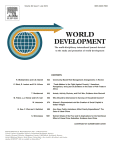
Instituto de Estudios sobre Desarrollo y Cooperación Internacional
Nazioarteko Lankidetza eta Garapenari Buruzko Ikasketa Institutua

Instituto de Estudios sobre Desarrollo y Cooperación Internacional
Nazioarteko Lankidetza eta Garapenari Buruzko Ikasketa Institutua
Instituto de Estudios sobre Desarrollo y Cooperación Internacional
Nazioarteko Lankidetza eta Garapenari Buruzko Ikasketa Institutua
«¿Por qué nos hemos apresurado tanto en derribar los diques que laboriosamente levantaron nuestros predecesores? ¿Tan seguros estamos de que no se avecinan inundaciones?», se preguntaba en 2010 el pensador británico Tony Judt en un libro balance cuya traducción española fue titulada Algo va mal. Hoy podemos mantener esta constatación –las inundaciones ya están entre nosotros– al examinar varias dimensiones globales del presente, en el contexto de lo que algunos han denominado el «retorno de la geopolítica».
Puedes consultar el índice y leer parte del contenido siguiendo este enlace.
Over the past five years, hunger has been on the rise again and the number of food crises is increasing. 828 million people were hungry around the world in 2022 – 46 million more than the previous year. According to the latest Global Report on Food Crises (World Food Programme, 2023), there were 58 food crises worldwide in 2022 and 258 million people were experiencing acute food insecurity, i.e. they were physically and economically unable to access enough safe, nutritious food. Undernutrition, which results in stunted growth, acute malnutrition and multiple deficiencies, is still the cause of almost half the deaths of children under five worldwide. Acute crisis situations aside, 3 billion people do not have access to a healthy diet. The food crisis, once the sad preserve of poor or war-torn countries, is now affecting industrialised countries. For example, 16% of French people say they do not eat their fill (Crédoc, 2023) and 26 million Americans went hungry in 2020 (U.S. Census Bureau).
Del editorial del nº25. Leer más aquí.
EDITORIAL: Cohabitar el mundo
AMASANDO LA REALIDAD
DE UN VISTAZO Y MUCHAS ARISTAS
EN PIE DE ESPIGA
VISITAS DE CAMPO
PALABRA DE CAMPO
ILUSTRACIÓN: Ivonne Navarro
Le Maroc actuel est saturé de références à la souveraineté économique, à l’instar de ce qu’a donné à voir la gestion du tremblement de terre de septembre 2023. Ce dossier, qui constitue le cœur de ce numéro double, a pour objectif de déconstruire cette notion ambivalente et plurielle. Il vise à mettre en évidence la diversité et la subtilité des enjeux politiques et économiques derrière les revendications toujours plus nombreuses de souveraineté. En abordant la souveraineté par ses modalités, le cas marocain permet de mettre en lumière les lieux d’exercice du pouvoir, les pratiques politiques ordinaires et les représentations de l’économie politique – autrement dit, les fondements économiques du pouvoir. Plus précisément, le dossier s’intéresse aux différentes manières par lesquelles la souveraineté économique est confortée ou revendiquée. Il rassemble des contributions sur les pouvoirs locaux, les trajectoires d’entreprises et d’entrepreneurs, la production et la vente de denrées alimentaires ou de cannabis, ou encore l’activité d’une commission nationale. Toutes éclairent l’importance, la diversité et la contingence des sources de souveraineté, ainsi que les conflits qu’elle suscite.
Le Dossier
Recherches
Conjoncture
Lectures
Este número de Ecología Política pone el foco en la pérdida de biodiversidad, abordando muchas de sus ramificaciones. «Crisis ecológica y pérdida de biodiversidad» analiza desde cómo incorporar a las comunidades indígenas y el mundo rural en la expansión de áreas protegidas, hasta la amenaza de la bioingeniería, pasando por la denuncia de los mecanismos de compensación y un sistema agroalimentario responsable de la mayoría de la pérdida de biodiversidad global.
OPINIÓN
EN PROFUNDIDAD
BREVES
REDES DE RESISTENCIA
REFERENTES AMBIENTALES
CRÍTICA DE LIBROS
EDITORIAL
REFLECTIONS
ARTICLES
EDITOR'S CHOICE
BOOK REVIEWS
CORRIGENDA
La democracia liberal no es la primera vez que vive una crisis profunda en la comunidad internacional. El término Democracia se utiliza en casi todos los regímenes, desde el franquista (democracia orgánica) a los de la órbita de la Antigua Unión Soviética (democracias populares), pasando por otros muchos, en todos los continentes, por lo que esta denominación no siempre tiene el mismo alcance y significado.
Hoy tenemos distopías para todos los gustos ideológicos, mientras el futuro parece cancelado como territorio de imaginación de un mundo mejor. En este contexto de «realismo capitalista», volver sobre la utopía –y sobre la posibilidad misma de imaginar futuros deseables– parece una condición para cualquier rearme ideológico progresista. Y a ello se dedica el Tema Central de este número de Nueva Sociedad.
Puedes consultar el índice y leer parte del contenido siguiendo este enlace.
CONTENIDOS
Sección General
Articles
Resources Compiled by Anandita Ghosh, Mahima Nayar, and Shivani Satija.
Book Reviews

|
Publicación mensual multidisciplinar de estudios sobre desarrollo, que explora la manera de mejorar las condiciones de vida en el mundo examinando soluciones potenciales a problemas tales como: pobreza, desempleo, malnutrición, enfermedades, condiciones de habitabilidad, recursos tecnológicos inapropiados, deuda externa, discriminación étnica y sexual, conflictos armados, déficit de participación popular en la esfera política y social. A través de las diferentes contribuciones se ofrecen alternativas constructivas y se subrayan las lecciones a aprender de las diferentes experiencias. En Hegoa se puede consultar desde el nº 1/1992. Disponible aquí. Última entrega
|
Sección especial: Sustainable Development, Energy, and Climate Change